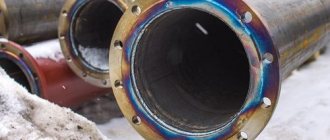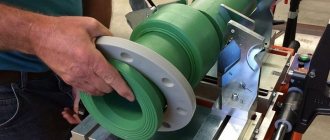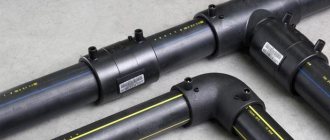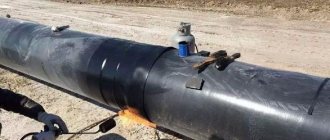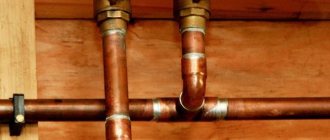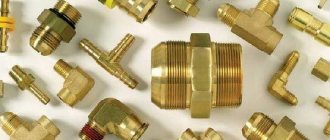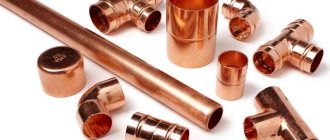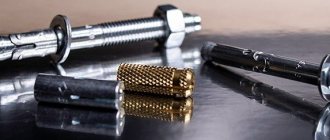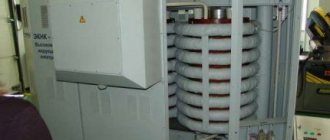Steel flange for detachable connections of polyethylene pipes
They are used for connecting pipeline fittings, valves and other industrial equipment to polyethylene HDPE pipes. For connections in plastic pipelines, a pressure flange is used in conjunction with a polyethylene bushing for the flange.
Polyethylene pipes are also successfully equipped with steel clamping flanges, and this is the most common method of fastening such pipes. To attach a steel flange to a pipe (necessarily on a polyethylene sleeve), its internal diameter (initially it is standard for all) is bored to the required size. The end of the sleeve is welded hermetically to the PVC pipe itself. In addition, they can be used to attach a metal pipe to a polyethylene pipe - the fastening will be quite strong and durable. The modern market offers steel flanges for PVC pipes with a maximum pressure of 10 and 16 atmospheres. Durable, corrosion-resistant alloy steel (the grade may vary depending on the purpose and type of pipeline) provides the required level of connection reliability - the pipeline will last a long period of time.
Flange for PE (art. 3/art. 20)
| Like Size | Ru 10 | Ru 16 | ||
| Weight, kg. | price, rub. | Weight, kg. | price, rub. | |
| 25 | 0,669 | 0,781 | ||
| 32 | 0,787 | 1,05 | ||
| 40 | 1,23 | 1,41 | ||
| 50 | 1,46 | 1,66 | ||
| 63 | 1,68 | 205 | 2,13 | |
| 75 | 2,36 | 2,92 | ||
| 90 | 2,62 | 385 | 3,23 | |
| 110 | 3,18 | 410 | 3,85 | |
| 125 | 2,96 | 3,59 | ||
| 140 | 4,19 | 4,98 | ||
| 160 | 5,52 | 870 | 6,58 | |
| 180 | 5,05 | 6,01 | ||
| 200 | 7,44 | 9,25 | ||
| 225 | 6,67 | 1320 | 8,25 | |
| 250 | 10,1 | 14,0 | ||
| 280 | 8,45 | 2040 | 11,9 | |
| 315 | 10,8 | 15,3 | ||
| 355 | 14,9 | 21,8 | ||
| 400 | 19,7 | 28,6 | ||
| 450 | 28,9 | 58,1 | ||
| 500 | 26,0 | 53,5 | ||
| 560 | 39,7 | 81,0 | ||
| 630 | 33,2 | 71,6 | ||
| 710 | 48,4 | 70,4 | ||
| 800 | 64,8 | 88,2 | ||
| 900 | 74,8 | 104 | ||
| 1000 | 93,8 | 148 | ||
| 1200 | 151 | 231 | ||
What are clamping flanges
First, let’s find out: what are clamping flanges? They are classified as specialized fittings for pipelines. And they are flat bored parts.
At first they are made according to a certain standard, then they are bored to obtain different diameters.
These connecting elements are used to connect tanks and metal pipelines with HDPE pipes through a sleeve. Thanks to such parts, the tightness, reliability, and strength of the unit are ensured. Polyethylene pipes are welded directly to the sleeve.
Characteristics and Features
The flange, in accordance with GOST, is produced by boring to the required diameter. The following steel grades are used:
- Art. 20;
- Art. 3.
The flanges are used in conditions where the temperature of the working medium corresponds to the range from -70 to +300 °C.
A retaining fitting is a flat product similar to a disk. It is designed for bolts, has holes, they are equidistant from each other. The part is installed together with the bushing, which is expanded for reinforcement.
In this regard, it turns out that the part itself does not fit well into the flange. However, this problem is eliminated after using bored elements. The internal diameter of the latter is increased to the required values, therefore perfect sealing of the joint is possible. Other parametric standards of the element are similar to analogues of the standard sample made of steel. Fundamental parameters characterizing flanged products for polyethylene pipelines:
- external dimension;
- diameter inside;
- operating pressure.
It is also important what the weight is.
Advantages of parts
The flange adapter of the clamping sample has a number of advantages in comparison with other elements. Therefore, it is quite common with specialized use. But for work you always need a flange connection diagram.
Experts call the following indicators the main advantages of the fitting:
- To install it, there is no need to spend a lot of time or use specially selected tools. So, you will need a wrench and a minimum of skills. With such “baggage” it is quite possible to install the part without any obstacles;
- The flange clamping adapter is capable of compensating for axial compression/tension, which makes the installation itself, as well as further operation, easier, and less time is spent on installation work.
Also, with such an adapter, reinforcing elements can be installed in a pipeline made of metal. And the repair activities of such systems become significantly simplified.
Flange for PE (12Х18Н10Т)
| Like Size | Ru 10 | Ru 16 | ||
| Weight, kg. | price, rub. | Weight, kg. | price, rub. | |
| 25 | ||||
| 32 | ||||
| 40 | ||||
| 50 | ||||
| 63 | ||||
| 75 | ||||
| 90 | ||||
| 110 | ||||
| 125 | ||||
| 140 | ||||
| 160 | ||||
| 180 | ||||
| 200 | ||||
| 225 | ||||
| 250 | ||||
| 280 | ||||
| 315 | ||||
| 355 | ||||
| 400 | ||||
| 450 | ||||
| 500 | ||||
| 560 | ||||
| 630 | ||||
| 710 | ||||
| 800 | ||||
| 900 | ||||
| 1000 | ||||
| 1200 | ||||
Pipe flange connection diagram
Installing a flange connection is so simple that any specialist will say that anyone can do such a job. It is only important to do everything in accordance with the scheme.
Flange for PE (st.09g2s)
| Like Size | Ru 10 | Ru 16 | ||
| Weight, kg. | price, rub. | Weight, kg. | price, rub. | |
| 25 | ||||
| 32 | ||||
| 40 | ||||
| 50 | ||||
| 63 | ||||
| 75 | ||||
| 90 | ||||
| 110 | ||||
| 125 | ||||
| 140 | ||||
| 160 | ||||
| 180 | ||||
| 200 | ||||
| 225 | ||||
| 250 | ||||
| 280 | ||||
| 315 | ||||
| 355 | ||||
| 400 | ||||
| 450 | ||||
| 500 | ||||
| 560 | ||||
| 630 | ||||
| 710 | ||||
| 800 | ||||
| 900 | ||||
| 1000 | ||||
| 1200 | ||||
Types of products
The main parameters by which flange products for PE and PVC pipes are characterized are the internal diameter, external dimensions, weight and operating pressure.
Depending on what tasks these parts perform, there are the following types of adapters:
- adapter with special welded bushings;
- slip-on metal flange;
- free-type flange adapter supported by a straight or tapered collar.
The best way to connect light and medium PE pipes with a diameter of no more than 150 mm and light pipes with a diameter of up to 300 mm is a loose flange supported by a straight collar. A loose flange with a tapered collar is used for fittings with a diameter of more than 200 mm.
Characteristics of the fixing flange for polyethylene pipes (video)
Advantages and disadvantages of a flange for PE and PVC pipes
The clamping steel loose flange adapter has several advantages over other parts, which makes it more popular to use. The main advantages of the fitting are as follows:
- The adapter allows you to install PE and PVC reinforcement elements into a metal pipeline, which also makes the repair of such systems more affordable.
- To install the flange, there is no need to use any special tools or spend a lot of time: a wrench and a little skill allow you to install the part without any problems.
- Also, the clamping flange adapter has the ability to compensate for the process of compression and expansion of the axis, and this allows for easier installation and operation, and reduces installation time.
As for the disadvantages, the most significant is the fact that the gasket that ensures a tight fit is destroyed. This occurs due to the fact that they are clamped as tightly as possible, and this leads to exceeding the tensile strength of the material.
Flange connection is the most reliable type of pipeline installation
Structurally, the flat clamping adapter is most unsuccessful in this regard, since it cannot protect the gasket from deformation.
Those product models in which gaskets are provided in some recesses are considered more protected from gasket rupture, however, they do not provide full protection, especially with a long service life of the part.
When installing a flange, take into account the fact that metal can expand when exposed to heat. This causes the fastener elements to elongate more than the adapter itself, which can compromise the seal of the flange connection.
Specifications
| RU | Outer diameter of PE pipe, mm | Dy , mm | D , mm | D 1 , mm | D0 , mm | b , mm | n , mm | d , mm | Weight, kg |
| 10 | 25 | 20 | 105 | 75 | 34 | 12 | 4 | 14 | 0,669 |
| 10 | 32 | 25 | 115 | 85 | 42 | 12 | 4 | 14 | 0,787 |
| 10 | 40 | 32 | 135 | 100 | 51 | 14 | 4 | 18 | 1,23 |
| 10 | 50 | 40 | 145 | 110 | 62 | 15 | 4 | 18 | 1,46 |
| 10 | 63 | 50 | 160 | 125 | 78 | 15 | 4 | 18 | 1,68 |
| 10 | 75 | 65 | 180 | 145 | 92 | 17 | 4 | 18 | 2,36 |
| 10 | 90 | 80 | 195 | 160 | 108 | 17 | 4 | 18 | 2,62 |
| 10 | 110 | 100 | 215 | 180 | 128 | 19 | 8 | 18 | 3,18 |
| 10 | 125 | 100 | 215 | 180 | 135 | 19 | 8 | 18 | 2,96 |
| 10 | 140 | 125 | 245 | 210 | 158 | 21 | 8 | 18 | 4,19 |
| 10 | 160 | 150 | 280 | 240 | 178 | 21 | 8 | 22 | 5,52 |
| 10 | 180 | 150 | 280 | 240 | 188 | 21 | 8 | 22 | 5,05 |
| 10 | 200 | 200 | 335 | 295 | 225 | 21 | 8 | 22 | 7,44 |
| 10 | 225 | 200 | 335 | 295 | 238 | 21 | 8 | 22 | 6,67 |
| 10 | 250 | 250 | 390 | 350 | 273 | 23 | 12 | 22 | 10,1 |
| 10 | 280 | 250 | 390 | 350 | 294 | 23 | 12 | 22 | 8,45 |
| 10 | 315 | 300 | 440 | 400 | 338 | 24 | 12 | 22 | 10,8 |
| 10 | 355 | 350 | 500 | 460 | 376 | 24 | 16 | 22 | 14,9 |
| 10 | 400 | 400 | 565 | 515 | 430 | 26 | 16 | 26 | 19,7 |
| 10 | 450 | 500 | 670 | 620 | 517 | 28 | 20 | 26 | 28,9 |
| 10 | 500 | 500 | 670 | 620 | 533 | 28 | 20 | 26 | 26,0 |
| 10 | 560 | 600 | 780 | 725 | 618 | 31 | 20 | 30 | 39,7 |
| 10 | 630 | 600 | 780 | 725 | 645 | 31 | 20 | 30 | 33,2 |
| 10 | 710 | 700 | 895 | 840 | 740 | 34 | 24 | 30 | 48,4 |
| 10 | 800 | 800 | 1010 | 950 | 843 | 37 | 24 | 33 | 64,8 |
| 10 | 900 | 900 | 1110 | 1050 | 947 | 40 | 28 | 33 | 74,8 |
| 10 | 1000 | 1000 | 1220 | 1160 | 1050 | 43 | 28 | 33 | 93,8 |
| 10 | 1200 | 1200 | 1455 | 1380 | 1260 | 51 | 32 | 39 | 151 |
| 16 | 25 | 20 | 105 | 75 | 34 | 14 | 4 | 14 | 0,781 |
| 16 | 32 | 25 | 115 | 85 | 42 | 16 | 4 | 14 | 1,05 |
| 16 | 40 | 32 | 135 | 100 | 51 | 16 | 4 | 18 | 1,41 |
| 16 | 50 | 40 | 145 | 110 | 62 | 17 | 4 | 18 | 1,66 |
| 16 | 63 | 50 | 160 | 125 | 78 | 19 | 4 | 18 | 2,13 |
| 16 | 75 | 65 | 180 | 145 | 92 | 21 | 4 | 18 | 2,92 |
| 16 | 90 | 80 | 195 | 160 | 108 | 21 | 4 | 18 | 3,23 |
| 16 | 110 | 100 | 215 | 180 | 128 | 23 | 8 | 18 | 3,85 |
| 16 | 125 | 100 | 215 | 180 | 135 | 23 | 8 | 18 | 3,59 |
| 16 | 140 | 125 | 245 | 210 | 158 | 25 | 8 | 18 | 4,98 |
| 16 | 160 | 150 | 280 | 240 | 178 | 25 | 8 | 22 | 6,58 |
| 16 | 180 | 150 | 280 | 240 | 188 | 25 | 8 | 22 | 6,01 |
| 16 | 200 | 200 | 335 | 295 | 225 | 27 | 12 | 22 | 9,25 |
| 16 | 225 | 200 | 335 | 295 | 238 | 27 | 12 | 22 | 8,25 |
| 16 | 250 | 250 | 405 | 355 | 273 | 28 | 12 | 26 | 14,0 |
| 16 | 280 | 250 | 405 | 355 | 294 | 28 | 12 | 26 | 11,9 |
| 16 | 315 | 300 | 460 | 410 | 338 | 28 | 12 | 26 | 15,3 |
| 16 | 355 | 350 | 520 | 470 | 376 | 30 | 16 | 26 | 21,8 |
| 16 | 400 | 400 | 580 | 525 | 430 | 34 | 16 | 30 | 28,6 |
| 16 | 450 | 500 | 710 | 650 | 517 | 44 | 20 | 33 | 58,1 |
| 16 | 500 | 500 | 710 | 650 | 533 | 44 | 20 | 33 | 53,5 |
| 16 | 560 | 600 | 840 | 770 | 618 | 45 | 20 | 39 | 81,0 |
| 16 | 630 | 600 | 840 | 770 | 645 | 45 | 20 | 39 | 71,6 |
| 16 | 710 | 700 | 910 | 840 | 740 | 47 | 24 | 39 | 70,4 |
| 16 | 800 | 800 | 1020 | 950 | 843 | 49 | 24 | 39 | 88,2 |
| 16 | 900 | 900 | 1120 | 1050 | 947 | 54 | 28 | 39 | 104 |
| 16 | 1000 | 1000 | 1255 | 1170 | 1050 | 58 | 28 | 45 | 148 |
| 16 | 1200 | 1200 | 1485 | 1390 | 1260 | 71 | 32 | 52 | 231 |
Part Features
The fixing fitting for PE and PVC pipes is a flat disk with equally spaced holes for bolts. This product is installed together with a collar or bushing.
The flange sleeve, which is mounted directly in front of the collar, has an extension for reinforcement. Because of this, the part itself does not fit tightly to the flange.
To eliminate this problem, special bored products are used, in which the internal diameter is increased to the required size, which contributes to the complete tightness of the joint. The remaining parameters of the part are completely similar to standard steel analogues.
Field of application of flanges
Steel products are used quite widely:
- in pressure and non-pressure pipelines;
- in precipitation drainage systems;
- in industrial networks;
- in storm sewer lines.
With the help of flange products, it is possible to achieve the most durable and tight connection of various network elements.
Welding a plastic pipe with a flange sleeve using an electric coupling
If necessary, such a unit can be easily dismantled for repair work or cleaning the system.
Flange - as an element of pipeline fittings
Product Features
Structurally, the fixing flange for PE pipes is a flat ring, or rather a disk, in which holes are located at the same distance. These holes are used to secure the connection using bolts (studs). Flanges are installed together with a collar or sleeve.
The sleeve for the PE flange directly in front of the flange has a special expansion for reinforcement, due to which the flange does not fit tightly against the flange. To solve this problem, bored flanges are used. Such products differ from standard products in that they have an increased (bored) internal diameter to the required size so that the flange fits tightly onto the bushing. All other parameters, such as the number of holes for bolts, their diameter, center-to-center distance, are fully consistent with a standard, flat, steel flange.
Flange bushing
Flange Applications
Steel flanges are used to connect polyethylene pipes:
- pressure and non-pressure pipelines;
- systems designed to remove precipitation;
- storm drainage;
- technical (industrial) pipelines, etc.
Thanks to flanges, it is possible to create a reliable, detachable connection of pipe products with various gate valves, taps (valves) and other pipeline fittings. If necessary, such a connection can be quickly disassembled for repair or cleaning of pipeline products.
Types of flanges
The geometric standard dimensions, as well as the manufacturing technology of these products, fully comply with the requirements of state standards. To organize the connection of different pipes with fittings and devices, the industry produces a wide range of products. All flanges for polyethylene pipes are characterized by:
- internal diameter;
- external dimensions;
- diameter of bolt holes;
- weight;
- working pressure.
Depending on the tasks performed, the following types of flanges are distinguished:
- With special welded bushings.
- Metal caps.
- Free type, supported by collars, which can be straight or tapered.
For connecting polyethylene pipelines laid with medium and heavy PE pipes with a diameter of no more than 150.0 mm, as well as light pipes with a large diameter (up to 300.0 mm), the best option would be loose flanges that rest on a straight collar. Free-type flanges, but supported by conical collars, are used for pipes with a diameter of 200.0 mm and more.
Why do polyethylene pipes need steel flanges?
HDPE pipes are certainly superior to steel pipes in the field of cold water pipes, but they have only recently appeared on the market, and metal routes still make up the majority of communications. Polyethylene pipes can be connected to them through permanent PE/steel connections, but sometimes a detachable connection is required. In such cases, steel flanges are used.
Their other area is shut-off and control equipment. Ball valves for HDPE pipes are produced only for small diameters, and for large pipes it is necessary to install metal valves with flanges.
Clamping flanges
Home > Design > Structural elements > Clamping flanges GOST 12815-80
A flange for HDPE pipes ( or a pressure flange ) is a steel flat welded flange bored out for a PE (HDPE) sleeve (collar). The flange is bored so that the inner diameter of the flange is larger than the outer diameter of the pipe, and the inner diameter of the pressure flange is chamfered on one side so that the sharp corner of the flange does not cut into the collar of the cast bushing. On the surface of the flange under the HDPE bushing there are special bolt holes for fastening. The connecting dimensions of the clamping flange correspond to GOST 12815-80.
Clamping flanges are widely used for connections between shut-off valves : gate valves, valves, plungers, check valves, etc., and HDPE pipelines, as well as for the transition from PE pipes to pipes and fittings made of ductile iron or steel. Flanges with HDPE bushings are used both for fittings and instrumentation with a flange connection, and for wafer installation.
When manufacturing polymer wells for installing various equipment, all bushings are pre-installed (welded) in the well immediately with flanges of the appropriate diameter and pressure. The equipment is mounted depending on the dimensions and weight, either during assembly in production, or after installing the well on site.
Steel grade:
steel 20, 25 according to GOST 1050-88; steel 09G2S according to GOST 19281-89; steel St3sp not lower than category 2 according to GOST 380-94; steel 12Х18Н9Т according to GOST 7769-82; steel 10G2 according to GOST 4543-71; steel 15Х5М according to GOST 4543-71
Ambient temperature: - 70°C to +300°C.
Conditional pressure: from 0.1 MPa to 2.5 MPa (from 1 kgf/cm2 to 25 kgf/cm2).
Typically, bored (pressing) flanges are produced for PE 100/80 pipes with a pressure of 10 and 16 atmospheres, but upon request it is possible to produce a pressure flange for 6 atm. and 25 atm. The drilling of the clamping flanges for 10 and 16 atmospheres is the same up to 150 diameters inclusive.
| Product designation GOST 12820-80 | Diameter DN, mm | Flange thickness, mm | Number of holes n, pcs | Hole diameter d, mm | Weight, kg | ||||
| adv. HDPE pipes DN | conditional Dy | adv. D | by bolt holes D1 | ext. D0 | |||||
| Steel clamping flange PN=10 (10 kgf/cm2, 1.0 MPa) GOST 12820-80 | |||||||||
| Steel clamping flange 20/25 | 25 | 20 | 105 | 75 | 31 | 12 | 4 | 14 | 0,78 |
| Steel clamping flange 25/32 | 32 | 25 | 115 | 85 | 42 | 12 | 4 | 14 | 1,05 |
| Steel clamping flange 32/40 | 40 | 32 | 135 | 100 | 51 | 14 | 4 | 18 | 1,41 |
| Steel clamping flange 40/50 | 50 | 40 | 145 | 110 | 62 | 15 | 4 | 18 | 1,76 |
| Steel clamping flange 50/63 | 63 | 50 | 160 | 125 | 78 | 15 | 4 | 18 | 2,02 |
| Steel clamping flange 65/75 | 75 | 65 | 180 | 145 | 92 | 17 | 4 | 18 | 2,79 |
| Steel clamping flange 80/90 | 90 | 80 | 195 | 160 | 108 | 17 | 4 | 18 | 3,40 |
| Steel clamping flange 100/110 | 110 | 100 | 215 | 180 | 128 | 19 | 8 | 18 | 4,03 |
| Steel clamping flange 100/125 | 125 | 100 | 215 | 180 | 135 | 19 | 8 | 18 | 3,76 |
| Steel clamping flange 125/140 | 140 | 125 | 245 | 210 | 158 | 21 | 8 | 18 | 5,20 |
| Steel clamping flange 150/160 | 160 | 150 | 280 | 240 | 178 | 21 | 8 | 22 | 6,86 |
| Steel clamping flange 150/180 | 180 | 150 | 280 | 240 | 188 | 21 | 8 | 22 | 6,28 |
| Steel clamping flange 200/200 | 200 | 200 | 335 | 295 | 225 | 21 | 8 | 22 | 9,25 |
| Steel clamping flange 200/225 | 225 | 200 | 335 | 295 | 238 | 21 | 8 | 22 | 8,28 |
| Steel clamping flange 250/250 | 250 | 250 | 390 | 350 | 273 | 23 | 12 | 22 | 12,4 |
| Steel clamping flange 250/280 | 280 | 250 | 390 | 350 | 294 | 23 | 12 | 22 | 10,3 |
| Steel clamping flange 300/315 | 315 | 300 | 440 | 400 | 338 | 24 | 12 | 22 | 13,6 |
| Steel clamping flange 350/355 | 355 | 350 | 500 | 460 | 376 | 24 | 16 | 22 | 19,9 |
| Steel clamping flange 400/400 | 400 | 400 | 656 | 515 | 430 | 26 | 16 | 26 | 25,9 |
| Steel clamping flange 500/450 | 450 | 500 | 670 | 620 | 517 | 28 | 20 | 26 | 39,4 |
| Steel clamping flange 500/500 | 500 | 500 | 670 | 620 | 533 | 28 | 20 | 26 | 35,4 |
| Steel clamping flange 600/560 | 560 | 600 | 780 | 725 | 618 | 31 | 20 | 30 | 51,4 |
| Steel clamping flange 600/630 | 630 | 600 | 780 | 725 | 645 | 31 | 20 | 30 | 43,0 |
| Steel clamping flange PN=16 (16 kgf/cm2, 1.6 MPa) GOST 12820-80 | |||||||||
| Steel clamping flange 20/25 | 25 | 20 | 105 | 75 | 34 | 14 | 4 | 14 | 0,89 |
| Steel clamping flange 25/32 | 32 | 25 | 115 | 85 | 42 | 16 | 4 | 14 | 1,18 |
| Steel clamping flange 32/40 | 40 | 32 | 135 | 100 | 51 | 16 | 4 | 18 | 1,59 |
| Steel clamping flange 40/50 | 50 | 40 | 145 | 110 | 62 | 17 | 4 | 18 | 1,96 |
| Steel clamping flange 50/63 | 63 | 50 | 160 | 125 | 78 | 19 | 4 | 18 | 2,25 |
| Steel clamping flange 65/75 | 75 | 65 | 180 | 145 | 92 | 21 | 4 | 18 | 3,07 |
| Steel clamping flange 80/90 | 90 | 80 | 195 | 160 | 108 | 21 | 4 | 18 | 3,71 |
| Steel clamping flange 100/110 | 110 | 100 | 215 | 180 | 128 | 23 | 8 | 18 | 4,37 |
| Steel clamping flange 100/125 | 125 | 100 | 215 | 180 | 135 | 23 | 8 | 18 | 4,07 |
| Steel clamping flange 125/140 | 140 | 125 | 245 | 210 | 158 | 25 | 8 | 18 | 5,6 |
| Steel clamping flange 150/160 | 160 | 150 | 280 | 240 | 178 | 25 | 8 | 22 | 7,39 |
| Steel clamping flange 150/180 | 180 | 150 | 280 | 240 | 188 | 25 | 8 | 22 | 6,76 |
| Steel clamping flange 200/200 | 200 | 200 | 335 | 295 | 225 | 27 | 12 | 22 | 9,63 |
| Steel clamping flange 200/225 | 225 | 200 | 335 | 295 | 238 | 27 | 12 | 22 | 8,59 |
| Steel clamping flange 250/250 | 250 | 250 | 405 | 355 | 273 | 28 | 12 | 26 | 15 |
| Steel clamping flange 250/280 | 280 | 250 | 405 | 355 | 294 | 28 | 12 | 26 | 12,8 |
| Steel clamping flange 300/315 | 315 | 300 | 460 | 410 | 338 | 28 | 12 | 26 | 17,6 |
| Steel clamping flange 350/355 | 355 | 350 | 520 | 470 | 376 | 30 | 16 | 26 | 24,8 |
| Steel clamping flange 400/400 | 400 | 400 | 580 | 525 | 430 | 34 | 16 | 30 | 30,4 |
| Steel clamping flange 500/450 | 450 | 500 | 710 | 650 | 517 | 44 | 16 | 33 | 55,7 |
| Steel clamping flange 500/500 | 500 | 500 | 710 | 650 | 533 | 44 | 20 | 33 | 51,3 |
| Steel clamping flange 600/560 | 560 | 600 | 840 | 770 | 618 | 45 | 20 | 36 | 77,1 |
| Steel clamping flange 600/630 | 630 | 600 | 840 | 770 | 645 | 45 | 20 | 36 | 58,2 |
| Loose stainless steel flange Py10 DIN2642 AISI 304, 316 | |||||||||
| Product designation | Diameter DN, mm | Flange thickness, mm | Number of holes n, pcs | Hole diameter d, mm | Weight, kg | ||||
| inch | conventional Dn, mm | internal D1, mm | external D3, mm | inter.axial distance D2, mm | |||||
| Loose stainless steel flange DN 15 | 1/2″ | 15 | 24 | 95 | 65 | 14 | 4 | 14 | 0,7 |
| Loose stainless steel flange DN 20 | 3/4″ | 20 | 30 | 105 | 75 | 14 | 4 | 14 | 0,9 |
| Loose stainless steel flange DN 25 | 1″ | 25 | 36 | 115 | 85 | 16 | 4 | 14 | 1,0 |
| Loose stainless steel flange DN 32 | 1 1/4″ | 32 | 46 | 140 | 100 | 16 | 4 | 18 | 1,7 |
| Loose stainless steel flange DN 40 | 1 1/2″ | 40 | 54 | 150 | 110 | 16 | 4 | 18 | 2,0 |
| Loose stainless steel flange DN 50 | 2″ | 50 | 65 | 165 | 125 | 16 | 4 | 18 | 2,5 |
| Loose stainless steel flange DN 65 | 2 1/2″ | 65 | 81 | 185 | 145 | 16 | 4 | 18 | 3,1 |
| Loose stainless steel flange DN 80 | 3″ | 80 | 94 | 200 | 160 | 18 | 8 | 18 | 3,3 |
| Loose stainless steel flange DN 100 | 4″ | 100 | 119 | 220 | 180 | 18 | 8 | 18 | 3,8 |
| Loose stainless steel flange DN 125 | 5″ | 125 | 145 | 250 | 210 | 18 | 8 | 18 | 5,2 |
| Loose stainless steel flange DN 150 | 6″ | 150 | 173 | 285 | 240 | 18 | 8 | 22 | 6,0 |
| Loose stainless steel flange DN 200 | 8″ | 200 | 225 | 340 | 295 | 20 | 8 | 22 | 8,9 |
| Loose stainless steel flange DN 250 | 10″ | 250 | 279 | 395 | 350 | 22 | 12 | 22 | 11,2 |
| Loose stainless steel flange DN 300 | 12″ | 300 | 329 | 445 | 400 | 26 | 12 | 22 | 13,0 |
| Loose stainless steel flange DN 350 | 14″ | 350 | 362 | 505 | 460 | 28 | 16 | 22 | 15,2 |
| Loose stainless steel flange DN 400 | 16″ | 400 | 413 | 565 | 515 | 32 | 16 | 26 | 21,0 |
| Loose stainless steel flange DN 500 | 20″ | 500 | 517 | 670 | 620 | 38 | 20 | 26 | 37 |
| Loose stainless steel flange DN 600 | 24″ | 600 | 618 | 780 | 725 | 44 | 20 | 30 | 56 |
The clamping flanges are fastened to the mating flanges using bolts/studs, nuts and washers. Fasteners are selected based on the diameter of the flange bolt hole. To achieve maximum tightness of the flange connection, a seal (gasket) made of paronite or rubber is installed between the flanges.
Matching HDPE pipes and flanges
When selecting pressure flanges for HDPE https://www.truby-vrn.ru/fitingi-pe-litie/flantsi-pnd, then, first of all, it is important to understand which equipment the pipe will be connected to. Only after this determination is it taken into account what type, material, and diameter the structure is.
The flanged connection of HDPE pipes is, in fact, one of the detachable installation methods used for joining valves - control and shut-off.
The fittings for installation on polyethylene pipelines are selected accordingly:
- standards;
- technical plan conditions;
- parameters of substances to be transported.
Also taken into account:
- design requirements;
- operating conditions.
The main pressure during operation of the culvert falls on the sleeve collar. The usual flanges, which are produced for steel pipelines (according to GOST), are not installed freely on the bushing. This happens because the inner diameter is narrow. That is why bored free flanges (also in accordance with GOST) with a diameter increased inside are used for flange connections of polyethylene pipelines. Thanks to this “option”, putting the connecting element on the pipe becomes quite simple.
The correspondence between the diameters of the HDPE culvert structure outside (nominal) and Dy of a free flange made of metal is as follows:
- fifty - forty;
- sixty three – fifty;
- seventy five – sixty five;
- ninety - eighty;
- one hundred ten / twenty five - one hundred and so on.
Indicators are indicated in millimeters.
Steel flanges, bored for PE bushing (collar). general information
The flanges for the sleeve (collar) are made of ST-20 and are intended for connecting PE (HDPE) pipes with steel and cast iron, as well as for mounting various shut-off and connecting valves with a flange connection. In addition, this is an option for a simple dismountable connection of PE (HDPE) pipes with each other.
This connection is made using polyethylene bushings (collars) under the flange , which are welded to the end of the polyethylene pipe using butt or electrofusion welding.
Bored flanges for PE pipes are produced in the range D=20-1200 mm and have a maximum operating pressure = PN 16 (1.6 MPa).
The diameter of the central hole of the bored flange is slightly larger than that of the welded flange made in accordance with GOST 54432-11 (12820-80). Flanges for PE collars are manufactured by boring, i.e. increasing the hole diameter of a standard weld flange. This is done in order to “fit” the flange onto the polyethylene sleeve (see figure) . Next, the end of the PE bushing is welded to the end of the PE pipe.
The distance between centers, the number and diameter of holes in flanges for PE pipes completely coincide with welded flanges manufactured in accordance with GOST 54432-11 (12820-80).
The dimensions of steel bored flanges are presented in the table:
| Outer diameter of PE pipe, mm | Dy, mm | D, mm | D1,mm | D0, mm | b, mm | n, pcs. | d, mm | Weight, kg |
| Maximum working pressure 1.0 MPa | ||||||||
| 25 | 20 | 105 | 75 | 34 | 12 | 4 | 14 | 0,669 |
| 32 | 25 | 115 | 85 | 42 | 12 | 4 | 14 | 0,787 |
| 40 | 32 | 135 | 100 | 51 | 14 | 4 | 18 | 1,23 |
| 50 | 40 | 145 | 110 | 62 | 15 | 4 | 18 | 1,46 |
| 63 | 50 | 160 | 125 | 78 | 15 | 4 | 18 | 1,68 |
| 75 | 65 | 180 | 145 | 92 | 17 | 4 | 18 | 2,36 |
| 90 | 80 | 195 | 160 | 108 | 17 | 4 | 18 | 2,62 |
| 110 | 100 | 215 | 180 | 128 | 19 | 8 | 18 | 3,185 |
| 125 | 100 | 215 | 180 | 135 | 19 | 8 | 18 | 2,96 |
| 140 | 125 | 245 | 210 | 158 | 21 | 8 | 18 | 4,19 |
| 160 | 150 | 280 | 240 | 178 | 21 | 8 | 22 | 5,52 |
| 180 | 150 | 280 | 240 | 188 | 21 | 8 | 22 | 5,05 |
| 200 | 200 | 335 | 295 | 225 | 21 | 8 | 22 | 7,44 |
| 225 | 200 | 335 | 295 | 238 | 21 | 8 | 22 | 6,67 |
| 250 | 250 | 390 | 350 | 273 | 23 | 12 | 22 | 10,1 |
| 280 | 250 | 390 | 350 | 294 | 23 | 12 | 22 | 8,45 |
| 315 | 300 | 440 | 400 | 338 | 24 | 12 | 22 | 10,8 |
| 355 | 350 | 500 | 460 | 376 | 24 | 16 | 22 | 14,9 |
| 400 | 400 | 365 | 515 | 430 | 26 | 16 | 26 | 19,7 |
| 450 | 500 | 670 | 620 | 517 | 28 | 20 | 26 | 28,9 |
| 500 | 500 | 670 | 620 | 533 | 28 | 20 | 26 | 26,0 |
| 560 | 600 | 780 | 725 | 618 | 31 | 20 | 30 | 39,7 |
| 630 | 600 | 780 | 725 | 645 | 31 | 20 | 30 | 33,2 |
| 710 | 700 | 895 | 840 | 740 | 34 | 24 | 30 | 48,4 |
| 800 | 800 | 1010 | 950 | 843 | 37 | 24 | 33 | 64,3 |
| 900 | 900 | 1110 | 1050 | 947 | 40 | 28 | 33 | 74,8 |
| 1000 | 1000 | 1220 | 1160 | 1050 | 43 | 28 | 33 | 93,8 |
| 1200 | 1200 | 1455 | 1380 | 1260 | 51 | 32 | 39 | 151 |
| Outer diameter of PE pipe, mm | Dy, mm | D, mm | D1,mm | D0, mm | b, mm | n, pcs. | d, mm | Weight, kg |
| Maximum operating pressure 1.6 MPa | ||||||||
| 25 | 20 | 105 | 75 | 34 | 14 | 4 | 14 | 0,781 |
| 32 | 25 | 115 | 85 | 42 | 16 | 4 | 14 | 1,05 |
| 40 | 32 | 135 | 100 | 51 | 16 | 4 | 18 | 1,41 |
| 50 | 40 | 145 | 110 | 62 | 17 | 4 | 18 | 1,66 |
| 63 | 50 | 160 | 125 | 78 | 19 | 4 | 18 | 2,13 |
| 75 | 65 | 180 | 145 | 92 | 21 | 4 | 18 | 2,92 |
| 90 | 80 | 195 | 160 | 108 | 21 | 4 | 18 | 3,23 |
| 110 | 100 | 215 | 180 | 128 | 23 | 8 | 18 | 3,85 |
| 125 | 100 | 215 | 180 | 135 | 23 | 8 | 18 | 3,59 |
| 140 | 125 | 245 | 210 | 158 | 25 | 8 | 18 | 4,98 |
| 160 | 150 | 280 | 240 | 178 | 25 | 8 | 22 | 6,58 |
| 180 | 150 | 280 | 240 | 188 | 25 | 8 | 22 | 6,01 |
| 200 | 200 | 335 | 295 | 225 | 27 | 12 | 22 | 9,25 |
| 225 | 200 | 335 | 295 | 238 | 27 | 12 | 22 | 8,25 |
| 250 | 250 | 405 | 355 | 273 | 28 | 12 | 26 | 14,0 |
| 280 | 2500 | 405 | 355 | 294 | 28 | 12 | 26 | 11,9 |
| 315 | 300 | 460 | 410 | 338 | 28 | 12 | 26 | 15,3 |
| 355 | 350 | 520 | 470 | 376 | 30 | 16 | 26 | 21,8 |
| 400 | 400 | 580 | 525 | 430 | 34 | 16 | 30 | 28,6 |
| 450 | 500 | 710 | 650 | 517 | 44 | 20 | 33 | 58,1 |
| 500 | 500 | 710 | 650 | 533 | 44 | 20 | 33 | 53,5 |
| 560 | 600 | 840 | 770 | 618 | 45 | 20 | 39 | 81,0 |
| 630 | 600 | 840 | 770 | 645 | 45 | 20 | 39 | 71,6 |
| 710 | 700 | 910 | 840 | 740 | 47 | 24 | 39 | 70,4 |
| 800 | 800 | 1020 | 950 | 843 | 49 | 24 | 39 | 88,2 |
| 900 | 900 | 1120 | 1050 | 947 | 54 | 28 | 39 | 104 |
| 1000 | 1000 | 1255 | 1170 | 1050 | 58 | 28 | 45 | 148 |
| 1200 | 1200 | 1485 | 1390 | 1260 | 71 | 32 | 52 | 231 |
We encourage you to work strictly with proven quality!
SOYUZ warehouses stock flat welded, bored and blind flanges of all standard sizes, strictly Russian production. Their advantages over flanges of Asian origin: higher strength, corrosion resistance, absence of pores and cavities.
For questions regarding the purchase of steel flanges:,
Also on this topic:
- Shut-off valves
- Repair and connecting fittings
- Molded PE fittings
